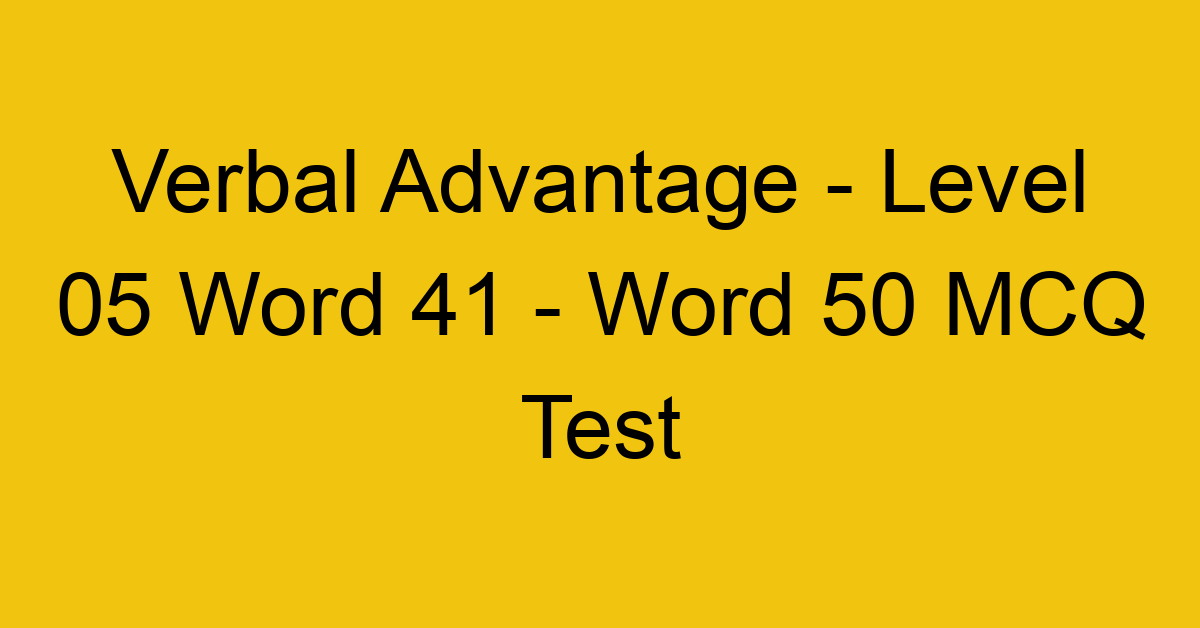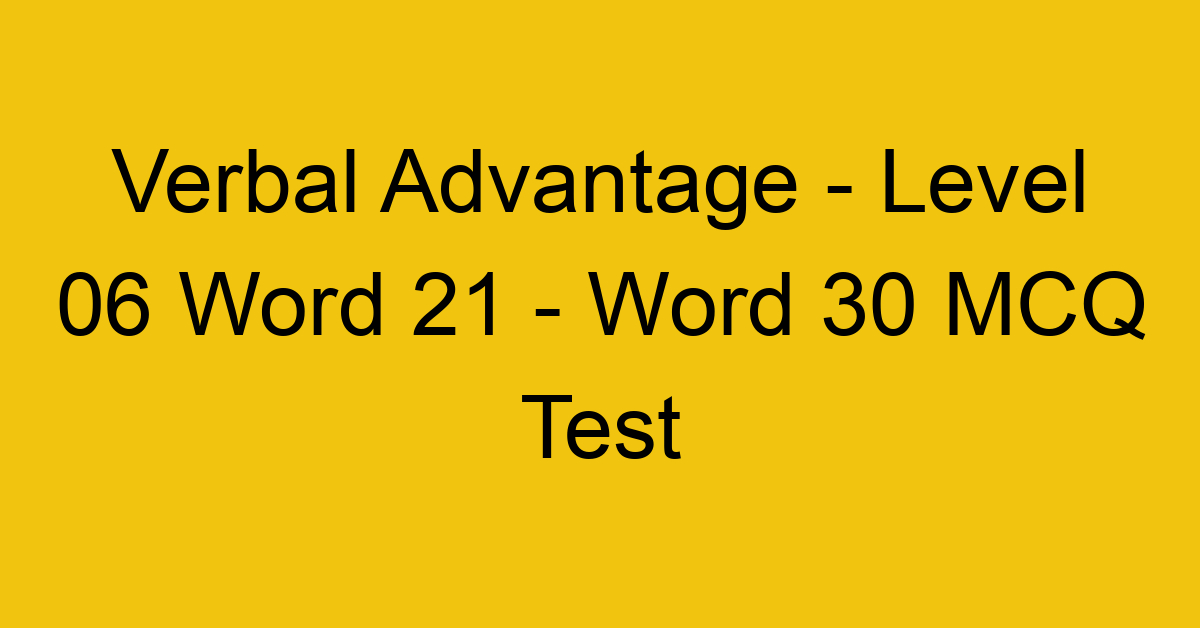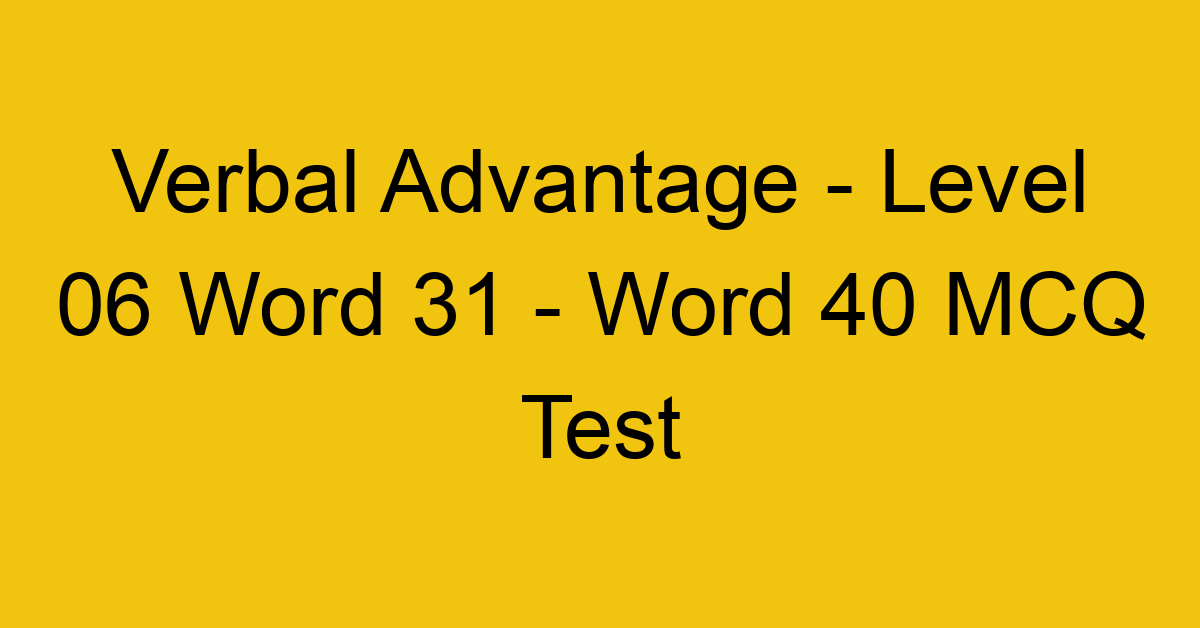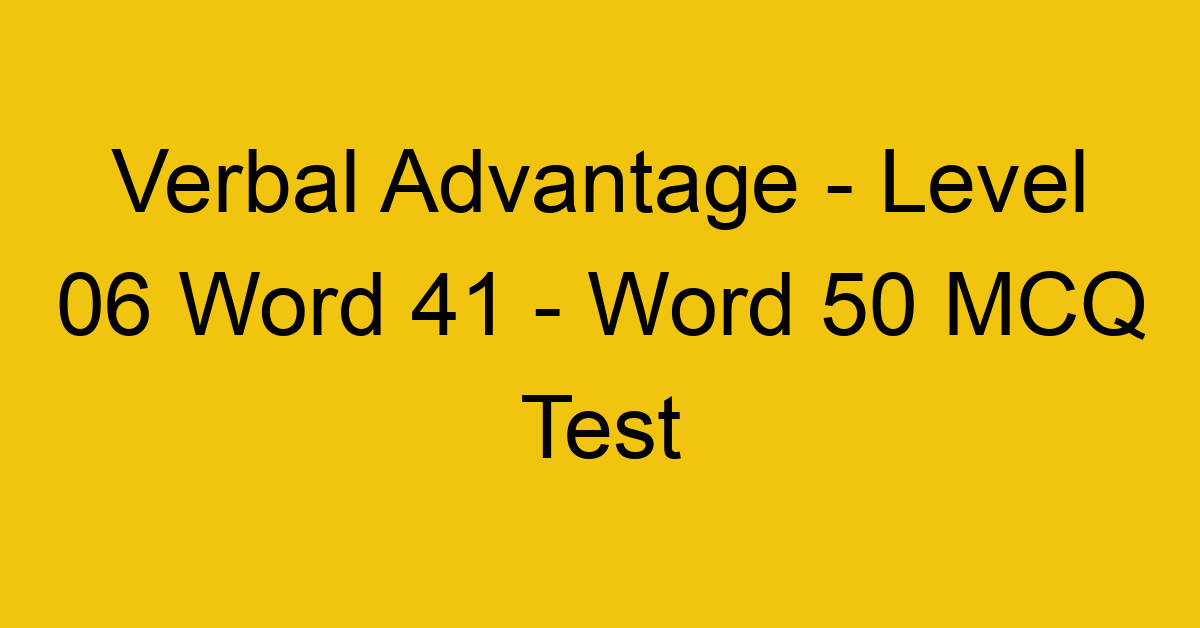Verbal Advantage - Level 06 Word 11 - Word 20 MCQ Test
Word List
- Word 11: Mnemonic [ni-MAHN-ik]
Helping or pertaining to the memory, assisting or improving the ability to recall.
→
The odd spelling of mnemonic, with its initial mn, comes from Greek. Ultimately, mnemonic comes from a Greek verb meaning to remember, and by derivation means “mindful.” In Greek mythology, Mnemosyne (ni-MAHS-uh-nee) is the goddess of memory and the mother of the nine Muses who preside over literature, the arts, and the sciences.
The adjective mnemonic means assisting or pertaining to the memory. A mnemonic device is a memory aid, something that helps one to remember. For example, the old rhyme, “Thirty days hath September, April, June, and November” is a mnemonic device for remembering the number of days in a given month. The term mnemonics refers to any technique or system for improving the memory.
Now, if you can remember all that, you’re doing well.
- Word 12: Sonorous [suh-NOR-us or SAHN-uh-rus]
Resonant; deep, full, and rich in sound; having, or capable of producing, a powerful, impressive sound: a sonorous voice; a sonorous speaker; the sonorous bells of a cathedral.
→
The pronunciation SAHN-uh-rus, with the accent on the first syllable, is a British import that began making its way into American speech in the late 1800s. The traditional American pronunciation is suh-NOR-us, with the stress on the second syllable. When it comes to American versus British pronunciation, my policy is that British speakers should use British pronunciations and American speakers should use American pronunciations. Perhaps indicating agreement with that dictum, the four leading current American dictionaries all list suh-NOR-us first. Nevertheless, it must be said that first- syllable stress in sonorous is more commonly heard today, and probably will prevail.
- Word 13: Admonish [ad-MAHN-ish]
To warn or notify of a fault or error, especially in conduct or attitude; to criticize or reprove gently but earnestly.
→
Synonyms of admonish include advise, counsel, caution, apprise (uh-PRYZ, like a prize), exhort (eg- or ig-ZORT), and expostulate (ek-SPAHS-chuh-layt). The corresponding noun is admonishment, a gentle warning or mild criticism.
To admonish comes from the Latin verb admonere, to warn, remind; the word suggests putting someone in mind of something he has forgotten, done wrong, or disregarded by giving him a strong but gently expressed warning or reminder. You can admonish an employee for tardiness or for overlooking an error; you can admonish a small child to obey a rule; or you can admonish a friend who is working too hard to take it easy.
- Word 14: Paradigm [PAR-uh-dim or PAR-uh-dym]
An example, model, or pattern.
→
Paradigm, which gets its unusual spelling from Greek, is used of an example that serves to illustrate or explain something or that serves as a model or pattern. Scholars develop paradigms for their theories; a novel may be a paradigm of contemporary morality; an important experience can serve as a paradigm for evaluating later experiences; and the successful strategy of one corporation may be the paradigm for another corporation’s plan to restructure itself and redefine its goals.
The corresponding adjective is paradigmatic (PAR-uh-dig-MAT-ik), which means exemplary, typical, serving as a model or pattern.
PAR-uh-dim is the original pronunciation, preferred by authorities of the eighteenth and nineteenth centuries. The alternative pronunciation PAR-uh-dym came along sometime before 1900 and appears to have originated in Britain; it is now preferred by most educated speakers on both sides of the Atlantic. Modern authorities and current dictionaries countenance both pronunciations, and you may say the word as you please.
- Word 15: Circuitous [sur-KYOO-i-tus]
Roundabout, indirect, not straightforward, following a roundabout and often extended course.
→
Challenging synonyms of circuitous include devious, meandering (mee-AN-dur-ing), sinuous (SIN-yoo-us), tortuous (TOR-choo-us), serpentine (SUR-pin-teen or -tyn), and labyrinthine (LAB-uh-RINthin), which means like a labyrinth or maze.
The adjective circuitous is formed by adding the suffix -ous to the familiar noun circuit. A circuit is a line or route that goes around and returns to where it started. Literally, circuitous means like a circuit, going around, following a roundabout and often lengthy course: “They took a circuitous route to avoid traffic”; “His argument was circuitous, going round and round and never getting to the point”; “Looking back on her career, Pamela realized that her path to success had been circuitous.”
- Word 16: Vindicate [VIN-di-kayt]
To clear from blame, free from suspicion of wrongdoing or dishonor, uphold or maintain the truth or innocence of something or someone in the face of criticism or imputations of guilt.
→
If you are accused of something but later the charge is dropped, then you have been vindicated. You can vindicate your good name or your reputation by clearing it from blame or suspicion. You can also vindicate a claim of ownership or your right to something by defending or upholding the truth of it.
The corresponding noun is vindication: “In a civil lawsuit, the plaintiff seeks restitution for an alleged wrong, and the defendant seeks vindication from the charges.”
To vindicate, to exonerate (eg- or ig-ZAHN-ur-ayt), and to acquit all mean to free from blame. Acquit refers specifically to a judicial decision to release someone from a charge. Exonerate implies removing the burden of guilt for a wrongdoing that may or may not have been committed. Vindicate means to clear from blame, criticism, or suspicion of guilt by bringing forth evidence and proving the unfairness of the charge. Someone may be acquitted by a jury and exonerated by his family and friends, but never vindicated in the eyes of the community.
- Word 17: Bucolic [byoo-KAHL-ik]
Rural, rustic, of or pertaining to country life.
→
Synonyms of bucolic include pastoral (PAS-tur-ul, be sure to stress the first syllable), provincial (pruh-VIN-shul), agrarian (uhGRAIR-ee-in), idyllic (eye-DIL-ik), and Arcadian (ahr-KAY-dee-in). Antonyms include urban, municipal, civic, metropolitan, and cosmopolitan.
Bucolic comes from Latin and Greek words meaning a herdsman, shepherd, which in turn come from the Greek bous, an ox. Bucolic may mean either pastoral, pertaining to shepherds, or rustic, pertaining to farming and country life. Bucolic poetry is poetry about the country or country folk; bucolic scenery is rural or rustic scenery. Sometimes bucolic is used in a depreciatory sense to poke fun at people who live in the country. When supercilious city dwellers speak of bucolic manners or bucolic customs, they mean to imply that those manners or customs are crude or unsophisticated.
- Word 18: Ostracize [AHS-truh-syz]
To banish, send into exile, expel from a place; to bar, exclude, or reject from a group or from acceptance by society: “His questionable conduct led to his being ostracized by the other members of his profession”; “After the embarrassing incident her friends began to avoid her, and eventually they ostracized her from their social life.”
→
The verb to ostracize, the corresponding noun ostracism (AHStruh-siz-’m), and the related word petalism (PET-’l-iz-’m) share an interesting history. Ostracism and petalism were forms of banishment employed by the ancient Greeks. Ostracize and ostracism come from the Greek ostrakon, a potsherd, a piece of broken pottery. Ostracism was practiced by the ancient Athenians as a way of removing from the city people considered dangerous or embarrassing to the state. Citizens would vote by writing the name of the person to be expelled on a potsherd (PAHT-shurd) or earthenware tablet. Banishment was for a period of ten years, after which time the person was considered vindicated and free to return.
Petalism was a similar mode of expulsion practiced in ancient Syracuse. Petalism differed from ostracism only in the method of voting, which was done by writing on an olive leaf instead of on a piece of clay, and in the length of the exile, which was for five instead of ten years. The Century Dictionary (1914) notes that petalism was eventually repealed “on account of its deterring the best citizens from participating in public affairs.”
- Word 19: Plethora [PLETH-uh-ruh]
An excess, surplus, overabundance, oversupply.
→
Synonyms of plethora include superabundance, profusion, superfluity (SOO-pur-FLOO-i-tee), and surfeit (SUR-fit).
Antonyms of plethora include scarcity, insufficiency, dearth (word 12 of Level 3), and paucity (PAW-si-tee): “The worst kind of boss is the one who offers a plethora of advice and a paucity of assistance.”
Plethora comes from the Greek plethein, to be full. In medicine the word is used to mean an excess of blood in the body; in general usage plethora may refer to any excess, surplus, or overabundance: “This report contains a plethora of dull statistics.” “Throughout her career she was blessed with a plethora of opportunities.” “American consumers no longer give the bulk of their business to small, specialized retailers, but instead prefer to shop at superstores that offer a plethora of merchandise at discount prices.”
Plethora is the noun; the corresponding adjective is plethoric (pleTHOR-ik). A plethoric harvest is an overabundant harvest, a bumper crop. Plethoric wealth is excessive wealth. Plethoric writing is verbose, inflated writing; it overflows with words or puffed-up self-importance. When used of language, plethoric is synonymous with the words bombastic (bahm-BAS-tik) and turgid (TUR-jid).
Plethora is sometimes mispronounced with the stress on the second syllable, ple-THOR-uh. Dictionaries do not recognize this variant. Be sure to stress the first syllable: PLETH-uh-ruh.
- Word 20: Proclivity [pro-KLIV-i-tee or proh-]
An inclination, liking, leaning; a strong natural bent or tendency, often toward something disagreeable, objectionable, or wicked.
→
Synonyms of proclivity include partiality (PAR-shee-AL-i-tee), penchant (PEN-chint, word 9 of Level 3), predisposition, predilection (PRED-i-LEK-shin), and propensity (pro-PEN-si-tee).
By derivation proclivity means a sloping forward or downward; hence, a leaning, tendency, or inclination. In current usage the word may have a neutral connotation, as a proclivity to study, a proclivity for music. More often, however, propensity is used in this neutral sense, and proclivity usually suggests a strong natural bent or inclination toward something bad or wrong. For example, a person may have a proclivity for drinking or gambling, a proclivity to lie, or antisocial proclivities.






